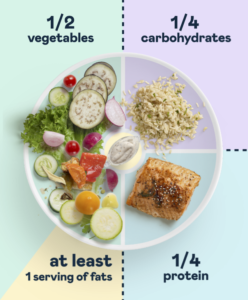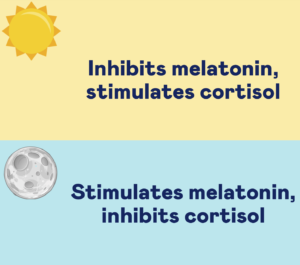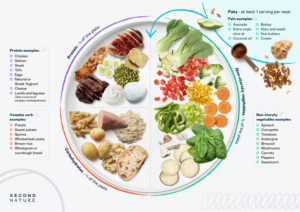Jump to: Why do you get the afternoon crash? | Improve your sleep hygiene | Get regular daylight exposure | Stabilise your blood sugar levels through a lower-carb diet rich in whole foods | Take home message
Maintaining energy levels during the day can be challenging, and many people experience the dreaded afternoon slump. When leading busy lives, it can be hard to get through the day without extra cups of coffee or walking into the staff kitchen for a boost of sugar.
This response is perfectly normal. We’re craving energy, so we seek the easiest solution to provide our bodies with it. This is how we’re wired: to find the easiest solution to problems we experience.
Unfortunately, if we become too reliant on sugary foods and excess caffeine to get through the day, this can harm our health in the long term and impact our energy levels mid-afternoon.
Excess caffeine could impact our sleep (further depleting our energy levels), and consuming sugar can lead to a dramatic rise and fall in our blood sugar levels, leading to further cravings for sugar to correct it.
Medication-assisted weight loss with a future focus
Start with Mounjaro, transition to habit-based health with our support

Why do you get the afternoon crash?
The reason you might struggle with your energy levels can be multifactorial and complex. Still, we’ve identified three strategies that could help stabilise your energy levels and prevent the afternoon crash:
1) Improve your sleep hygiene
Most people need at least 7-9 hours of sleep per night. Many people might think ‘they do just fine’ on less than this, but the truth is less than 5% of the population are believed to be able to function well on low levels of sleep.
Going to bed at the same time each night, doing a calm activity before bed, and avoiding caffeine after midday are all proven ways of improving sleep.
2) Get regular daylight exposure
Our sleep/wake cycle (known as our circadian rhythm) is regulated by a series of hormones which respond to daylight exposure or Zeitgebers (time cues).
When we don’t get enough Zeitgebers during the day, our body can start to secrete too much melatonin, making us feel drowsy. So going outside once or twice a day can positively affect melatonin regulation and improve sleep quality.
3) Stabilise your blood sugar levels through a lower-carb diet rich in whole foods
A diet rich in ultra-processed foods and sugar can lead to blood sugar levels going on a rollercoaster.
This not only impacts our energy levels during the day, but it can also impact our sleep – impacting our energy levels even further. Switching to a lower-carb whole-food diet is a proven way of stabilising your blood sugar levels which can have a positive impact in the long term.

At Second Nature, we focus on identifying the root causes of the problem. We provide personalised advice from a registered nutritionist on improving your energy levels in the long term, not just providing you with a quick fix.
If you’d like to join people like Josie, who now wakes up feeling full of energy after being on the Second Nature programme, click here to take our health quiz.
Otherwise, keep reading as we dig into three evidence-based approaches to help you stabilise your energy levels and avoid the afternoon crash for good.
1) Improve your sleep hygiene
We all know that sleep is good for us and how much better we feel after a good night’s sleep. Despite reports of us being in a sleep ‘epidemic’, research has suggested that we spend more time in bed and average around 8 hours of sleep per night in 2015 compared to around 7 hours in 1974.
Despite this, many people report feeling lethargic and not well rested after their night’s sleep, and our sleep quality may be more of an issue than total sleep time. Our sleep quality is measured by the balance of time spent in the four different stages of sleep.
Fortunately, there are ways that we can improve the quality of our sleep that are simple, free, and evidence-based.
1) Avoid phone and social media use 1-2 hours before bedtime
Research has suggested that using social media before bed can harm sleep quality. It may be a combination of the blue light from the phones and the stimulation of social media use that has a negative effect.
Try calming activities before bedtime, such as reading, meditating, or listening to music.
2) Avoid caffeine after midday
Adenosine is the hormone that helps you drift off to sleep. Caffeine binds to the adenosine receptors in your brain, blocking the effects of adenosine.
Caffeine also has a quarter-life of 12 hours, so if you’re caffeine-sensitive and drinking coffee into the afternoon, caffeine will still be in your system, blocking adenosine throughout the night.
Try switching to decaf or caffeine-free hot drinks like herbal tea after midday.
3) Go to bed at the same time each night
Our circadian rhythm (the internal clock) is not only regulated by day and night exposure but also by routine.
If you go to bed at the same time each night, your body becomes better at releasing the hormones you need to help you drift off to a good night’s sleep in the right balance.
Key points:
- It’s been suggested that despite getting enough sleep on average, many of us struggle to get good quality sleep.
- Avoiding phone and social media before bed, caffeine after midday, and going to bed at the same time each night are three practical strategies to help improve the quality of your sleep.
2) Get regular daylight exposure
Our body is regulated by what’s known as our circadian rhythm; this is our internal clock that responds to time cues known as Zeitgebers. The circadian rhythm helps regulate the release of certain hormones throughout the day and night to support sleep and energy levels.
For example, early in the morning, cortisol levels increase to provide feelings of alertness but then decrease during the day. As we move into the evening, melatonin levels increase to help us feel drowsy and drift off to sleep at night.

Regular daylight exposure has been shown to significantly affect the regulation of our circadian rhythm and is our body’s most vital Zeitgeber to help give you an energy boost.
A study compared two groups of office workers; the first group spent their workday in a darker windowless environment, and the second was in a bright environment with plenty of windows.
The results showed that individuals in a darker windowless environment reported lower quality of life scores, more physical health problems, poorer sleep, and lower energy levels. While other factors likely influence this, it suggests light exposure impacts your mental and physical health.
Interestingly, a study on older adults found that two hours of daylight exposure each day – between 9 am-10 am and 5 pm-6 pm – changed melatonin levels in the body, which may be a sign of an improvement in their circadian rhythm.
Remember, you’re allowed to take a break from your computer screen; your work will be there for you when you return.
Here are three tips for getting regular daytime exposure:
1) Have a morning walk or exercise outdoors
If you’re working from home, this could be part of your commute, a walk in the countryside or the local park.
2) Form a walking or exercise group with friends from work
Our environments often influence us, and if our colleagues or friends don’t tend to go outside during the day or at lunchtime, neither do we.
Encourage your colleagues to get some fresh air daily to keep each other accountable.
3) Get a dog
Exercise and physical activity are non-negotiable for a dog, making it non-negotiable for you too. Getting a furry friend could be the perfect way to help you get outside twice a day.
Key points:
- Our body is regulated by our circadian rhythm, an internal clock that controls the balance of our hormones and helps our body’s cells to function.
- These hormones impact our energy levels, particularly the balance of cortisol and melatonin.
- Not getting enough daylight exposure has been associated with dysregulated melatonin secretion and low energy levels.
- Walking and exercising outdoors with friends, colleagues, or a pet are great ways of getting more regular daylight exposure.
3) Stabilise your blood sugar levels through a lower-carb diet rich in whole foods
As mentioned above, an essential hormone in our sleep/wake cycle is cortisol. When cortisol is high, melatonin tends to be low, and we feel stimulated, and the reverse is true. When cortisol is low, melatonin will be higher, making us drowsy.
Disruption of this balance can harm our energy levels during the day and also impact our sleep, which can harm our energy levels further.
The release of cortisol is regulated by an area of the brain known as the HPA axis, which is also responsible for our stress response. When the HPA-axis is overstimulated, it can dysregulate the balance of hormones keeping our sleep/wake cycle and energy levels in check.
How is this related to blood sugar?
Research suggests that poorly controlled blood sugar levels can overstimulate our HPA axis, leading to an imbalance in hormones that regulate our energy levels and sleep/wake cycle.
Similarly, excess glucose (carbohydrates/sugar) has been shown to inhibit the action of a neurotransmitter known as orexin. Orexin plays a vital role in regulating energy levels; a lack of orexin is linked to the development of narcolepsy (a brain disorder where people suddenly fall asleep).
Lower-carb diets have been proven to stabilise blood sugar levels, helping to regulate energy release and your sleep/wake cycle. Lower-carb diets are also typically richer in protein which has been shown to stimulate the action of orexin, countering the impact of glucose.
Hydration is also essential to avoid tiredness, so keep a glass of water on your desk. Aim for 6-8 glasses a day if you can.
What does a whole food lower-carb diet look like?
It encourages the consumption of:
- High-quality protein sources like meat, fish, dairy, tofu, and tempeh.
- Whole food sources of fat like meat, oily fish, dairy, nuts, seeds, olive oil, and avocado.
- Fibre from vegetables, fruit, nuts, seeds, and other plant-based foods.
- Some complex carbohydrates like sweet potato, whole grains, and whole wheat pasta.
- Healthy snacks like veggies and hummus.
It discourages the consumption of:
- Ultra-processed foods such as crisps, supermarket bread, pastries, and biscuits.
- Refined carbohydrates such as white rice, white pasta, and cereals.
- Added sugars.

Key points:
- Our body’s energy levels are partly regulated by several hormones, particularly cortisol, melatonin, and orexin.
- Poorly controlled blood sugar levels and a high intake of refined carbohydrates and sugars may harm the balance of these hormones and our energy levels.
- Lower-carb diets can stabilise blood sugar levels, supporting the body’s regular release of cortisol, melatonin, and orexin.
Take home message
Humans are wired to seek the easiest solution to difficult problems. When we feel lethargic or find our energy levels crashing, we often revert to a simple solution of consuming foods or drinks enriched in energy and the stimulating effects of caffeine.
While these will work in the short term, ironically, they will likely have the opposite effect in the long term and harm your energy levels, making you more tired and likely to experience the dreaded afternoon crash.
By focusing on the bigger picture and taking a more holistic approach, you’ll likely have more success in improving your energy levels and health.


